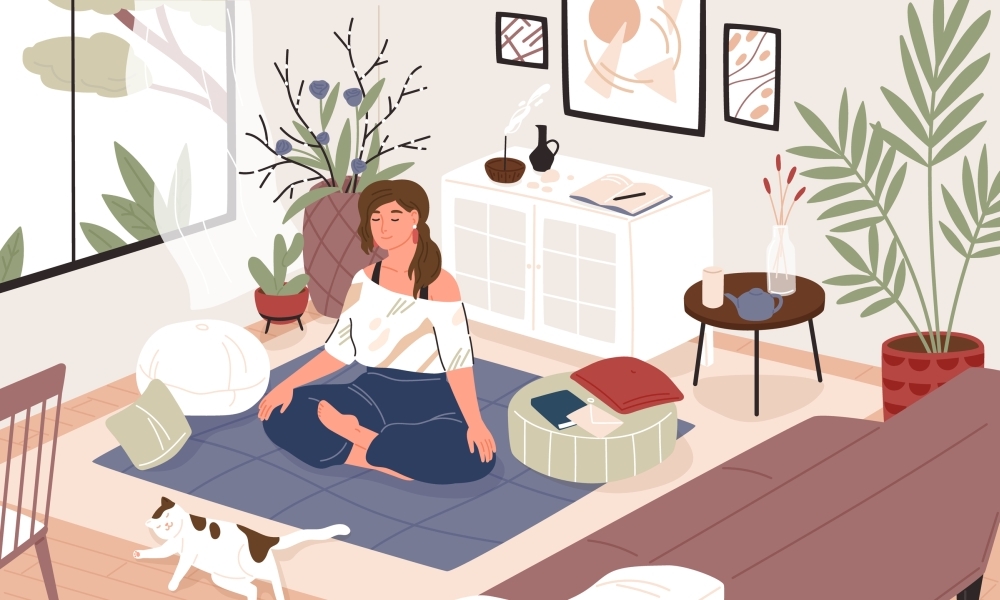While yoga can be a popular physical exercise, it has been, for thousands of years, primarily a meditation practice.
Yoga is an ancient practice and meditation, focused around a group of physical, mental, and spiritual disciplines.
There are many styles of yoga practice for the physical body. Hatha (a combination of many styles) is one of the most popular. It is a more physical type of yoga rather than a still, meditative form. Ashtanga (a highly structured vinyasa-style class), Bikram (hot yoga) and Iyengar (focused on finding the correct alignment in each pose) are other popular forms.
Dr Marc Cohen is a university professor and medical doctor. His work on integrative and holistic medicine has made significant impacts on education, research, clinical practice and policy. In 2012 he co-authored a paper called Yoga in Australia: Results of a national survey, the first of its kind in Australia.
The survey of 3892 people who practice yoga found that it was seen to assist in the management of specific health issues and medical conditions. The findings suggest regular yoga practice may also exert a healthy lifestyle effect including vegetarianism, non-smoking, reduced alcohol consumption, increased exercise and reduced stress with resulting cost benefits to the community (Penman et al, 2012).
Reflecting on the study now, Cohen says the research team uncovered a lot of really great data about the reasons why people start yoga in the first place.
‘The Yoga in Australia study allowed us to gather some great data. We found the longer that people do yoga, the more likely they are to have other positive lifestyle practices. The longer you do yoga, the less likely you are to smoke, or to eat processed food. We also found people often went into yoga because of a physical issue – back pain, for example – but they kept doing yoga for mental health benefits. So very often the reason you continue yoga is different from the reason you start yoga,’ he tells Wellbeing by Teacher.
Yoga as a way of life
Cohen says that while the Yoga in Australia study uncovered that many people with existing conditions like back pain, anxiety and depression were getting good results from their yoga practice, it was meant to be a preventative measure rather than a treatment.
‘Yoga was never meant to be a treatment for disease. Yoga is designed to be something you do every day so you don’t get sick in the first place. Yoga is a whole series of practices that include: lifestyle, attitude, codes of ethics, karma, the selfless service, breathing exercises,’ Cohen says. He adds that people often refer to ‘yoga’ as physical postures or what they do at a class, but that can be limiting.
‘We talk about yoga as the way you live your life and the attitudes you have. The thoughts you have, and the way you treat other people, or the way you treat the environment, and your service and devotion, singing and community work. So yoga is really multifaceted, and just to think about yoga as what you do on a mat and in yoga class is limiting,’ he says.
Yoga to improve health and lifestyle choices
Yoga develops inner awareness and it helps develop breath and strength of mind and body. Cohen says that when you’ve got a good relationship between your mind and your body, other things can go right.
‘Yoga sets you on this virtuous spiral – so you’ve got a better outlook on life, you’re less anxious, your body feels better, you’ve got more flexibility, so then you’ve got more bounce in your step and people relate to you differently. That’s positive reinforcement, so you sleep better and you wake up and you’ve got more focus. Yoga helps create this virtuous spiral that then propels your life into a union. Your mind, you body and your environment all become one,’ Cohen says.
The Yoga in Australia study also found that people who practice yoga were more likely to make positive lifestyle choices, particularly when it comes to diet.
‘We found that people who do yoga are more likely to be vegetarian. I think it’s a raising of your consciousness, because yoga is essentially about raising consciousness, and when you have a higher consciousness you become more conscious about where your food comes from. It’s a natural progression I think. The longer people do yoga the more likely they are to be vegetarian, to be conscious about their diet,’ he says.
Tips for getting started
Cohen offers some simple tips for people interested in yoga practice, but are unsure where to get started. He says it’s much better to do little things often, than to try and do an immersive thing that you can’t sustain.
‘It can be as simple as – when you wake up in the morning, just lie in bed and do some conscious breathing by yourself. You don’t need a mat, you don’t need a class. It’s becoming more mindful of what you do every day, the things you do naturally every day. So that can be even just the way you walk and you hold yourself,’ he shares.
‘As we said in our survey, people start yoga because of a problem, they’ve got back pain or some issue they want to deal with, and then they realise they feel really good and want to keep doing it. You don’t have to wait until you have a problem, you can start yoga at any time.
‘Karma yoga is a beautiful way to start which is just selfless service, volunteering and helping other people. And often when you receive help yourself, it’s a really powerful thing to help someone else and realise, even though you feel like you need help, there are people worse off than you. People wouldn’t think of that as yoga, but it is.’
References
Penman, S., Cohen, M., Stevens, P., & Jackson, S. (2012). Yoga in Australia: Results of a national survey. International journal of yoga, 5(2), 92–101. https://doi.org/10.4103/0973-6131.98217
Do you exercise to care for your own health and wellbeing? Do you have any fitness tips that you’d like to share with your Wellbeing by Teacher readers? We’d love to hear about it. Email us with a brief outline and we’ll be in touch.


